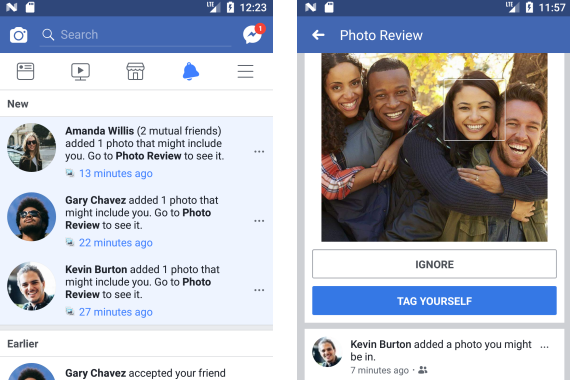 EMERGING TECH
EMERGING TECH
 EMERGING TECH
EMERGING TECH
 EMERGING TECH
EMERGING TECH
Facebook Inc. announced today that it will begin using its facial recognition technology to recognize users in any picture, whether they are tagged in it or not.
The purpose of the feature, according to Facebook, is to help users better manage their online identity. “Powered by the same technology we’ve used to suggest friends you may want to tag in photos or videos, these new features help you find photos that you’re not tagged in and help you detect when others might be attempting to use your image as their profile picture,” Joaquin Quiñonero Candela, director of applied machine learning at Facebook, said in a blog post.
The feature, which is powered by Facebook’s artificial intelligence technology, will alert users when someone else uploads a photo of them. The alerts make it easier for users to tag themselves if they like the photo, but they also allow users to contact the uploader of the photo if they have a problem with it. Facebook said the new feature can also protect users from online impersonators by spotting people who are attempting to use the same profile picture.
Candela noted that users will not receive alerts for every photo in which they appear. The system only looks for users if they are in the intended audience for an upload, so they will not be alerted of pictures that have been shared privately or only with certain groups.
Facebook jumped ahead of potential privacy fears today with another of its Hard Questions posts, addressing some of the concerns users might have over the social network’s growing use of facial recognition technology.
“The words ‘face recognition’ can make some people feel uneasy, conjuring dystopian scenes from science fiction,” wrote Rob Sherman, Facebook’s deputy chief privacy officer. “Can someone use it to identify strangers on the street? Are institutions gathering mass databases of images that can be used to invade someone’s privacy or rights?”
Sherman said that facial recognition has many positive uses, but he conceded that the technology can also be used “in concerning ways.” However, he argued against strict regulation of facial recognition technology, comparing current fears to similar concerns in the late 1800s over cameras.
Sherman said regulators “took action on uses that raised concerns — for example, by prohibiting stalking or letting people sue for invasion of privacy — rather than requiring licenses to use ‘camera technology’ or written consent forms before a person could appear in a photo.”
For users who are not convinced that the multibillion-dollar corporation has their best interests at heart, Facebook is adding a simple on/off button for its facial recognition features, which users can access through their account settings. According to Sherman, this option will “completely turn off face recognition technology” for a user’s account.
“Some may criticize this as an ‘all or nothing’ approach, but we believe this will prevent people from having to make additional decisions among potentially confusing options,” said Sherman. He added that Facebook has no plans ever to use face recognition to help strangers identify users, and he said the company will continue listening to user feedback as it rolls out more features that rely on the technology.
Support our mission to keep content open and free by engaging with theCUBE community. Join theCUBE’s Alumni Trust Network, where technology leaders connect, share intelligence and create opportunities.
Founded by tech visionaries John Furrier and Dave Vellante, SiliconANGLE Media has built a dynamic ecosystem of industry-leading digital media brands that reach 15+ million elite tech professionals. Our new proprietary theCUBE AI Video Cloud is breaking ground in audience interaction, leveraging theCUBEai.com neural network to help technology companies make data-driven decisions and stay at the forefront of industry conversations.